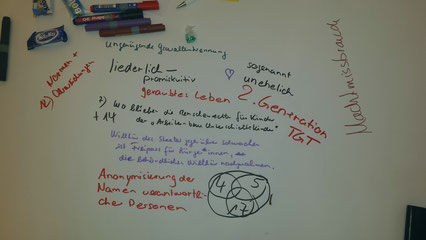
Gestern fand eine Veranstaltung der Nationalfonds-Projektleitung NFP76 mit Betroffenen statt, bei der die bisher eingereichten Projektskizzen vorgestellt wurden. Es ist eine umfassende Themenliste mit 77 Projekten, von denen ungefähr die Hälfte realisiert werden können.
Die Veranstaltung war dicht und gut aufgegleist. Dafür bin ich dankbar.
Mit grossem Bedauern musste ich jedoch feststellen, dass die Auswirkungen der fürsorgerischen Zwangsmassnahmen auf die zweite Generation in der Forschung immer noch
ausgespart werden.
Schon die UEK löst ihr Versprechen nicht ein, beim Thema "Folgen der Fürsorgerischen Zwangsmassnahmen" in der "Administrativen Versorgung" die zweite Generation miteinzubeziehen. Dies obwohl mir gesagt wurde, es gebe Historiker*innen, die sehr interessiert seien am Thema.
Zuweilen tauchen Überlegungen wie diese auf: ob wohl die Entscheidungsträger befürchten, wenn sie der zweiten Generation mehr Raum gäben, entstünden neue Forderungen?
Es ist zu hoffen, dass die Themenliste ergänzt wird mit der zweiten Generation, der Transgenerationalen Weitergabe von Traumata und deren Folgen.
Ein weiterer wichtiger Punkt, der geklärt gehört: Oft wurden diese Kinder nicht nur mit Schlägen oder Essensentzug und/oder psychisch misshandelt, was schrecklich genug gewesen wäre. Viele wurden auch Opfer sexualisierter Gewalt. Wenn sie überhaupt die Kraft hatten, die Täter anzuzeigen, was passierte dann? Wurden sie bei der Polizei und vor Gericht gleich behandelt wie Kinder aus sogenannt intakten Familien. Oder wurde ihnen ihre Herkunft vorgeworfen und sie selbst nicht ernst genommen? Das möchten wir untersucht haben.

Compulsory Social Measures and Placements: Will the processing of the history take place without the second generation?
Yesterday, an event of the National Fund Project Management NFP76 took place with concerned persons. The previously submitted project sketches were presented. It's a comprehensive list of topics with 77 projects, about half of which will be realized.
The event was very compact and well presented. I am grateful for that.
I regret, however, that in the research the impact of the compulsory social measures and placements on the second generation til now has been left blank so far.
Even the IEC doesn't keep the promise to include the second generation under the topic "Consequences of the Compulsory Social Measures and Placements" in the so called "Administrative Detention". Although I was told, that there are enough historians very interested in the subject.
At times, such considerations emerge: are there any decision-makers, who are afraid that if they pay more attention to the second generation, new demands would arise?
We expect, that the topic list will be supplemented by the second generation and the transgenerational passing on of trauma and its consequences.
Another important point, which has to be clarified: Often these children were not only mistreated with beatings or deprivation of food or psychologically. This would have been terrible enough. But many also were victims of sexualized violence. If they had the strength to report the perpetrators, what happened? At the police and in court were they treated equally as children from so-called intact families? Or were they reproached their origin and they were not taken seriously? We would like to have investigated this.
I tagged the contract children. Other groups are:
-
Children, who were forced to live in children's homes
- Children who by day were forced to stay with a foster family
- Young mothers who were forced to stay in administrative detention, usually in a prison, whithout judical decision, because their only offense was to have born an child without being married.
- Children who were given away under constraint
- Victims of child psychiatry
- Mothers who were forced to give away their children for adoption
- Women and men, who were sterilised or castrated against their wish
- Yeniche and Sinte and their children, the so called “Children of the Country Road”
- Spazzacamini – small children from the canton Ticino, who were sold to sweep chimneys in Italy (Milano)
- Victims of drug trials in psychiatry.
NB: Bei den "Tags" habe ich die Verdingkinder eingetragen. Weitere Opfergruppen sind hier gelistet
